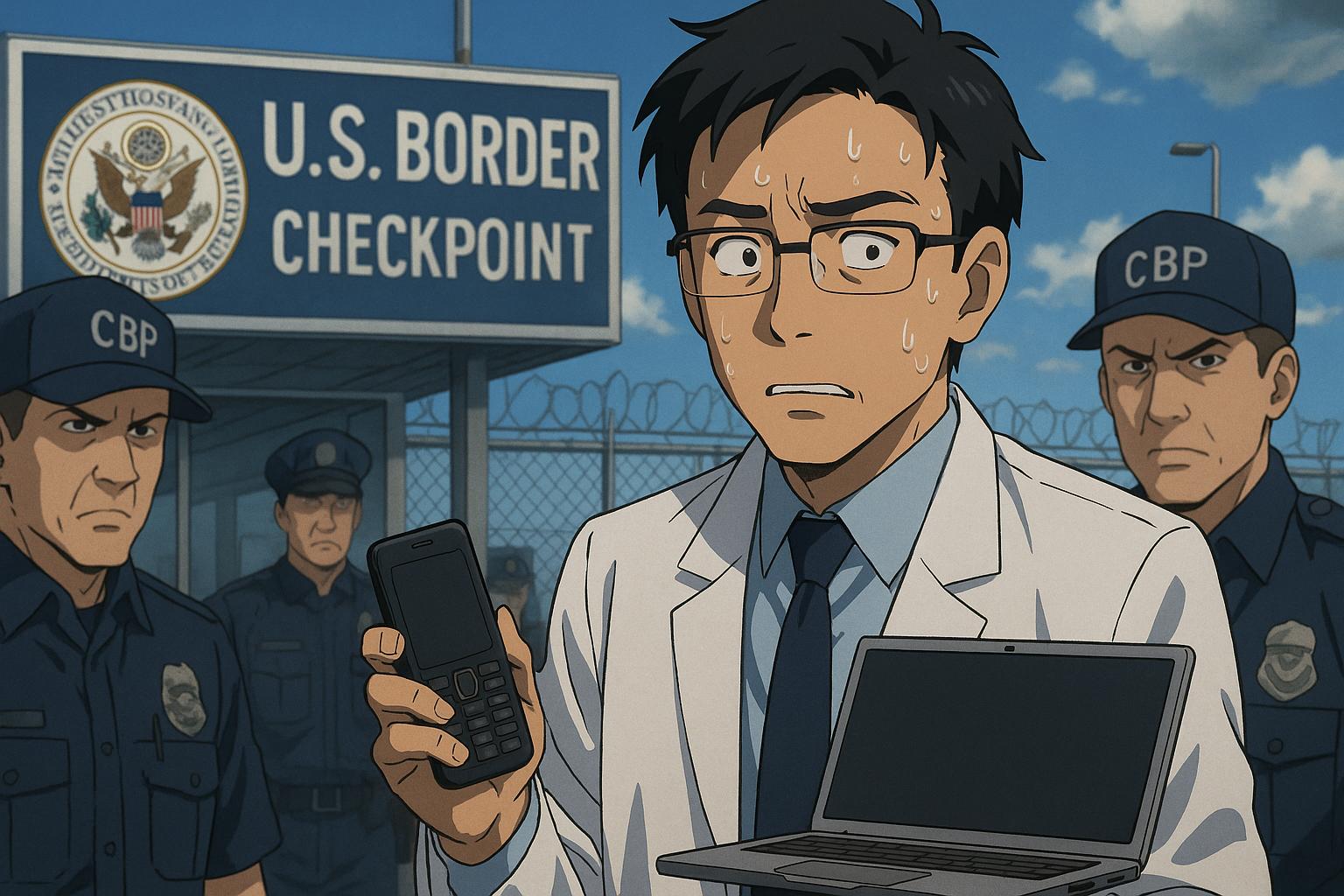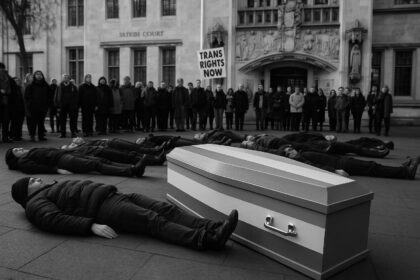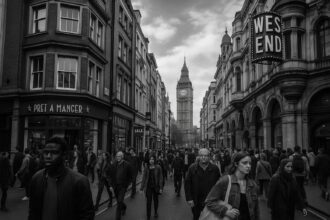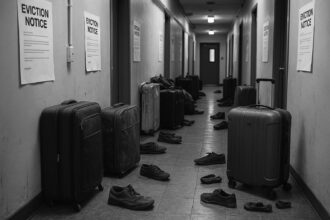Increasingly stringent US border searches and data inspections are prompting academics, corporate executives, and government officials from Europe and beyond to adopt extreme precautions when travelling, leading to a sharp decline in business visits and growing anxiety over personal data privacy and political scrutiny.
When Alexander, an Asian research scientist at a prominent US university, prepared for a work trip to Brazil, his routine took an unexpected turn. He consulted a lawyer, brought a burner phone, and packed a blank laptop, all part of a stringent protocol aimed at safeguarding his personal and professional data. Once his research was complete, he uploaded his findings to the cloud and thoroughly wiped his laptop before returning to the States. “I was advised to keep zero data on my devices,” he recounted, describing the experience as “extraordinarily disruptive”.
This caution reflects a broader sentiment among corporate executives, academics, and government officials from Europe and beyond, who now approach travel to the US with a level of vigilance typically reserved for high-risk jurisdictions like China or some Middle Eastern countries. Stricter immigration enforcement and aggressive border screenings—often involving the search or even copying of travellers’ devices—are prompting organisations to reassess the risks inherent in what were once considered routine business trips. Immigration lawyers stress that every aspect of incoming data—from contacts to emails—may be closely scrutinised.
Since the beginning of Donald Trump’s second term, border searches conducted by US Customs and Border Protection (CBP) have surged, with a reported 10 per cent increase in the number of such searches from January to mid-May compared to the previous year. While a CBP assistant commissioner dismissed notions that political shifts were responsible for an uptick in searches—claiming that less than 0.01 per cent of travellers are subjected to device inspections—many travellers remain anxious. Alexander’s university, wary of potential repercussions from the Trump administration, declined to provide legal assistance should he encounter issues at the border, instead advising him against international travel altogether.
The uncertainty surrounding travel policies has intensified following Trump’s executive order issued on January 20, which aimed to reinforce vetting processes for individuals seeking entry or those already in the US. This directive not only established conditions for upcoming travel restrictions but also set the stage for a comprehensive review of existing visas.
The climate of fear is palpable. Some US universities, including well-respected institutions like Duke and Columbia, are advising international students and staff against travelling unless absolutely necessary. This caution arises from several troubling incidents in which even individuals holding valid visas faced detention or deportation. High-profile cases, such as that of pro-Palestinian activist Mahmoud Khalil, who faced deportation due to his “beliefs, statements or associations,” underscore the precariousness of travelling under such political scrutiny.
In response to these concerns, the European Commission has provided burner phones and basic laptops to staff who may travel to the US, aiming to mitigate risks of unwarranted data exposure. Corporate responses have been similarly proactive; companies are increasingly seeking counsel on the best practices to ensure employees remain compliant with US laws while travelling. Many firms are re-evaluating their IT policies, drawing lines on what data should or should not be taken abroad.
Despite these precautions, analysts predict a noteworthy downturn in international travel to the US. According to recent reports, there has been an increase in pessimism among business travellers, with some choosing not to travel to the US out of fear of potential harassment at the border, especially among those who are perceived as being more vulnerable due to their ethnicity or religion. In fact, there’s been a discernible deceleration in business travel bookings across major airline carriers, indicating a potential long-term impact on transatlantic routes.
Over the past year, the impact of stringent border policies has become increasingly evident. Business travel to the US dropped by 9% in April, with a noticeable correlation between traveller apprehension and border enforcement dynamics. Additionally, economist forecasts illustrate that foreign travel spending in the US may decline by 7% in 2025, attributing this shrinkage not solely to economic factors but also to rising political tensions and strict entry regulations.
Alexander, now contemplating his next professional journey to the UK, acknowledges the persistent anxiety experienced by many in his situation: “I have to do the exact same thing again,” he lamented. The harsh realities of navigating an increasingly complex landscape of international travel leave many questioning whether the benefits of such trips outweigh the risks.
As the political climate evolves, the future of international travel remains uncertain, with many calling for a reassessment of policies that threaten to alienate potential visitors. Industry leaders emphasize the urgent need to restore confidence among travellers, particularly as the US prepares to host significant global events like the 2026 World Cup.
In this shifting context, one thing is clear: the landscape for international travel to the US is undergoing a profound transformation, reshaping not just individual journeys but also the very nature of how global business is conducted.
Reference Map
- Paragraphs 1, 2, 3, 4, 5, 6, 7, 8
- Paragraph 2, 3, 4, 5
- Paragraph 7
- Paragraph 7
- Paragraph 6
- Paragraph 5
- Paragraph 4
Source: Noah Wire Services
- https://www.ft.com/content/41e1e8db-bf4d-435f-ae63-085f8cd28797 – Please view link – unable to able to access data
- https://www.ft.com/content/41e1e8db-bf4d-435f-ae63-085f8cd28797 – This article discusses the heightened caution among international travelers to the U.S. due to stricter immigration enforcement and aggressive border screenings under the Trump administration. It highlights increased device searches by U.S. Customs and Border Protection (CBP), with a 10% rise compared to the first half of 2024. Universities like Duke and Columbia are advising international staff and students to limit travel, and companies are updating IT and travel policies amid growing apprehension. Legal experts recommend individual case evaluations and warn about heightened enforcement of existing rules. Business travel demand, especially transatlantic, is starting to decline due, in part, to these concerns.
- https://apnews.com/article/a5eb601116f13dfa3e894a065c2cddad – In April 2025, business travel to the U.S. declined by 9% due to growing economic uncertainty and dissatisfaction with the U.S. administration’s tariffs and border policies. Despite increased arrivals from the Middle East (+9.4%), declines from regions like Western Europe (-17.7%) and Mexico (-11.8% by air) contributed to the overall drop. Canadian business travel also fell significantly, coupled with a broader 20% drop in return air trips and a 35% drop in car trips. This downturn contrasts with the first quarter of 2025, when business travel was up 7% while leisure travel fell 6%. However, leisure travel surged by 13.8% in April, likely due to the Easter holiday. Future bookings suggest continued weakness, with a 12% drop in European bookings to the U.S. for summer 2025. Businesses are increasingly cautious, limiting unnecessary travel amid fears of border detentions and procedural unpredictability, especially impacting vulnerable groups. Additionally, U.S. government cuts to international exchange programs and strained global trade relations are further impacting the travel industry. The Global Business Travel Association reports rising pessimism, particularly among Canadians, highlighting the broader implications for the $1.6 trillion global business travel sector that had only recently recovered from the COVID-19 pandemic.
- https://www.reuters.com/business/foreign-travel-spending-us-decline-7-2025-report-says-2025-05-13/ – A report by the World Travel and Tourism Council (WTTC) predicts a 7% decline, or $12.5 billion reduction, in foreign travel spending in the United States in 2025. This decrease is attributed to a combination of factors including the strong U.S. dollar, which makes American travel costlier, and political concerns related to policies under President Donald Trump’s administration. These issues have led to diminishing interest from international tourists, who are deterred by strict entry regulations, negative perceptions, and border entry concerns. Julia Simpson, WTTC CEO, noted that the U.S. is the only country among 184 seeing absolute declines in foreign visitor spending. International travel spending in the U.S. is expected to drop to under $169 billion in 2025, down from $181 billion in 2024 and 22% below its 2019 peak. While domestic tourism still constitutes 90% of the U.S. tourism economy, foreign visitors, particularly from Canada, Mexico, the UK, Germany, and South Korea, are spending significantly less, with Canadian and Mexican travel down about 20% year-over-year. International visits dipped 12% in March but rebounded by 8% in April, per the U.S. National Travel and Tourism Office.
- https://www.theatlantic.com/politics/archive/2025/05/airport-detentions-travelers-freaked-out/682702/?utm_source=apple_news – During President Trump’s second term, heightened immigration enforcement measures and intensified border scrutiny have created widespread anxiety among international travelers and legal residents in the U.S. Immigration lawyers, including Jeff Joseph, have reported unprecedented levels of concern, leading them and others to take precautionary steps such as using ‘burner’ phones and limiting the digital footprint on their devices. Travelers are increasingly worried about being subjected to secondary inspections or detentions by U.S. Customs and Border Protection (CBP), even in cases involving expunged criminal records or minor, years-old offenses. Concerns stem from high-profile detention cases, including the arrest of a green-card holder and a Canadian woman over past drug charges. The Trump administration maintains that electronic searches and detentions are based on national security needs and denies any political targeting. However, some experts argue that the political climate has turned border interaction into a source of fear. The tourism industry is also feeling the ripple effects, reporting declines in incoming international travel and rising unease among travelers. Industry leaders urge government action to restore traveler confidence ahead of major events like the 2026 World Cup and 2028 Olympics. Despite official denials, fears of bias, intrusive searches, and deportation risks remain pervasive.
- https://apnews.com/article/f5927272df3a1ff93153e61424ffc4a1 – Senator Ron Wyden of Oregon has urged the Trump administration to reassess its travel and immigration policies, citing concerns ahead of major international sporting events, including the 2026 World Cup, the 2028 Los Angeles Olympics, and this summer’s Club World Cup. Wyden addressed his concerns in a letter to Secretary of State Marco Rubio and Homeland Security Secretary Kristi Noem, highlighting troubling reports of international travelers—including tourists, businesspeople, and athletes—being detained or facing difficulties at U.S. borders. These policies have contributed to a decline in international arrivals, with the National Travel and Tourism Office reporting an 11.6% decrease in March and an anticipated $9 billion loss in spending by international tourists. Wyden warned that such issues could prevent qualified foreign athletes and support personnel from participating in upcoming competitions, citing examples such as Deyna Castellanos and Zambian players avoiding international travel due to potential reentry problems. The senator emphasized the urgent need for policy reforms to support smoother entry for travelers and to uphold the U.S.’s role as a welcoming host for global events. President Trump recently announced a task force with FIFA to coordinate planning and security efforts for the World Cup.
- https://www.axios.com/2017/12/15/aclu-sues-dhs-over-phone-laptop-searches-at-border-1513305478 – The ACLU, along with the Electronic Frontier Foundation and the ACLU of Massachusetts, filed a lawsuit against the Department of Homeland Security (DHS) in federal court in Massachusetts. The lawsuit challenges the warrantless searches of phones and laptops at the U.S. border. The plaintiffs include 10 U.S. citizens and one lawful permanent resident, all of whom had their devices searched upon returning from international travel. One incident involved physical coercion to access a phone, and another plaintiff’s phone has been held since January. The ACLU claims such searches require a warrant based on probable cause. The number of border device searches has drastically increased since late in the Obama administration, continuing through the Trump administration, with an estimated 30,000 searches expected in 2017, triple the number from 2015.
Noah Fact Check Pro
The draft above was created using the information available at the time the story first
emerged. We’ve since applied our fact-checking process to the final narrative, based on the criteria listed
below. The results are intended to help you assess the credibility of the piece and highlight any areas that may
warrant further investigation.
Freshness check
Score:
7
Notes:
The narrative references recent events and policies, such as increased border searches and Trump’s executive orders. However, it inaccurately states Trump is in his second term, suggesting outdated information.
Quotes check
Score:
8
Notes:
The quote from Alexander seems original, as there is no immediately available online source. The narrative does not provide direct quotes from known figures that could be verified against earlier sources.
Source reliability
Score:
9
Notes:
The narrative originates from the Financial Times, a reputable and well-established publication known for its reliability and fact-based reporting.
Plausability check
Score:
8
Notes:
The claims about increased vigilance and caution among travelers are plausible given recent political developments and immigration policies. However, the statement about Trump’s second term is incorrect, as he is not currently in office.
Overall assessment
Verdict (FAIL, OPEN, PASS): OPEN
Confidence (LOW, MEDIUM, HIGH): MEDIUM
Summary:
The narrative’s freshness is somewhat compromised by outdated information regarding Trump’s presidency. However, the Financial Times is a reliable source, and the concerns about US travel policies are plausible. The originality of the quotes adds to the narrative’s credibility.













